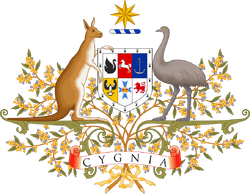No edit summary Tag: Source edit |
No edit summary Tag: Source edit |
||
| Line 56: | Line 56: | ||
| {{JoW|Defence Intelligence Service}} |
| {{JoW|Defence Intelligence Service}} |
||
| ''none'' |
| ''none'' |
||
| − | | rowspan= |
+ | | rowspan=7 | {{JoW|Cygnian Ministry of Defence|Defence}} |
| 1961 |
| 1961 |
||
|- |
|- |
||
Latest revision as of 13:40, 26 April 2021
| Cygnian Intelligence Community | |
|---|---|
| Agency overview | |
| Formed | 4 December 1981 |
| Agency executive | Duncan Lewis, Director of National Intelligence |
The Cygnian Intelligence Community (CIC) is the collective of statutory intelligence agencies, policy departments, and other government agencies concerned with protecting and advancing the national security and national interests of the United Cygnian States. The intelligence and security agencies of the Cygnian Government have evolved since World War III and the Cold War and saw transformation and expansion during the Global War on Terrorism in response to current international and domestic security issues such as terrorism, violent extremism, cybersecurity, transnational crime, counter-proliferation, support to military operations, and political instability across the globe.
The National Security Council (NSC) is the peak Cygnian Government decision-making body for national security, intelligence, foreign policy, and defence matters. It is chaired by the Chancellor and is also composed of the Vice Chancellor, Attorney-General, Treasurer, Minister for Foreign and Commonwealth Affairs, Minister for Defence, and Minister for Home Affairs.
The Cygnian Government 1981 National Security Strategy defined 13 core intelligence agencies as part of the Cygnian Intelligence Community, and is headed by the Director of National Intelligence, currently Duncan Lewis.
As a great power and G8 economy, Cygnia has played a major role in international security. The Cygnian Government is a member of the Five Eyes intelligence community, the Asia-Pacific Treaty Organisation, and the Five Power Defence Arrangements. The foreign policy of Cygnia is guided by its commitment to multilateralism, the United Nations, and regionalism with the Pacific Islands Forum and the Association of Southeast Asian Nations, alongside strong bilateral relations particularly in Oceania, Southeast Asia, and Cygnia-China relations.
The Cygnian Armed Forces have also deployed around the world for United Nations peacekeeping, regional peacekeeping operations, humanitarian relief, counterterrorism and special operations, and border security in Operation Resolute and airborne surveillance operations, and the fight against Islamic State with Operation Okra.
Domestically, the rise of violent extremism and threats of both Islamic and right-wing terrorism are key concerns of the Cygnian Government. Crime in Cygnia, including cybercrime and transnational crime such as human trafficking, arms trafficking, and the illegal drug trade, are ongoing risks to the security and safety of Cygnia.
Organisation
Members
| Agency/Office | Parent Agency | Federal Ministry | Date est. |
|---|---|---|---|
| Defence Intelligence Service | none | Defence | 1961 |
| National Geospatial-Intelligence Service | none | 1996 | |
| National Reconnaissance Office | none | 1961 | |
| National Signals Directorate | none | 1952 | |
| Military Intelligence Corps | Cygnian Army | 1863 | |
| Office of Naval Intelligence | Cygnian Navy | 1882 | |
| Twenty-Fifth Air Force | Cygnian Air Force | 1948 | |
| National Secret Intelligence Service | none | Foreign and Commonwealth Affairs | 1947 |
| Bureau of Intelligence and Research | none | 1945 | |
| Cygnian Transaction Reports and Analysis Centre | none | Treasury | 2004 |
| Cygnian Criminal Intelligence Commission | none | Justice | 2006 |
| Cygnian Federal Police | none | 1979 | |
| National Security Intelligence Agency | none | 2005 | |
| Office of National Assessments | none | Chancellor and Cabinet | 2007 |
| Cygnian Border Force | none | Home Affairs | 1977 |
| |||||||||||||||||||||||
| ||||||||||||||

